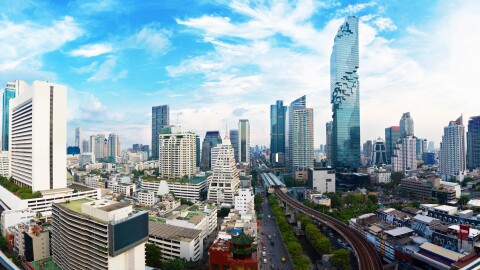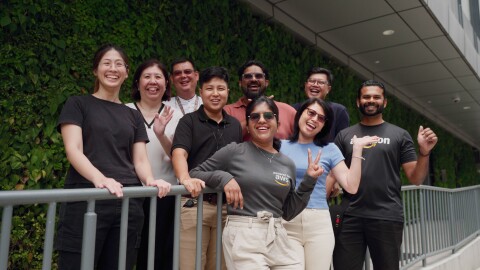As the global movement to digitize grows, and the applications organizations build to meet customer demand become more distributed, the need for low latency – the time it takes for data to pass from one point on a network to another – becomes even more critical. By reducing latency, organizations can help improve the performance of their applications, process large amounts of data faster, and drive productivity gains.
To meet this demand and bring cloud technologies closer to more customers, we are excited to announce that we are deepening our infrastructure investments in APJ with plans to launch 10 new AWS Local Zones in six countries. AWS Local Zones are a type of infrastructure deployment that places AWS compute, storage, database, and other services closer to customers – enabling them to build and deploy applications that require single-digit millisecond latency closer to end users or on-premises data centers.
AWS Local Zones will roll out across Australia (Brisbane and Perth), India (Bengaluru, Chennai, Delhi, and Kolkata), New Zealand (Auckland), the Philippines (Manilla), Thailand (Bangkok), and Vietnam (Hanoi), joining a further 22 new AWS Local Zones planned to launch in 20 additional countries around the world over the next two years – reaching hundreds of millions of end users.
Making it easy to go digital at lower latency
The very-low latency access that AWS Local Zones provide supports customers with applications such as remote real-time gaming, media and entertainment content creation, live video streaming, engineering simulations, augmented and virtual reality, and more. This new infrastructure will allow customers to rapidly deploy new services and products that support an even faster and better customer experience. By adopting sought after capabilities made possible by the cloud with no upfront infrastructure investment, organizations in APJ gain the agility needed in a changing world, where what works today may not work next week.
To make it easier for customers to tap into the benefits of this new infrastructure, AWS manages and supports AWS Local Zones, meaning organizations do not need to incur the expense and effort of procuring, operating, and maintaining infrastructure to support low-latency applications.
Contributing to local communities
Over the last 15 years, AWS has built out an impressive global infrastructure that spans over 26 geographic regions and 84 Availability Zones (AZs) across the globe. This includes AWS Regions in Singapore, Sydney, Mumbai, Osaka, Tokyo, Seoul, and Jakarta and further investments planned in Auckland and Hyderabad, and Melbourne.
We are committed to helping local economies unlock the potential of the cloud by deepening our local investments with the rollout of new cloud infrastructure – giving local governments and business of all sizes, and across all industries, the ability to tap into the world’s most comprehensive and broadly adopted cloud platform. The economic impact of the cloud creates a multiplier effect, from job creation and improving productivity, to strengthening operational resilience and enabling greater agility.
Unlocking the full potential of cloud requires organizations and communities to have the right skills in place. Recent research conducted by AlphaBeta and commissioned by AWS, reveals that the need for advanced cloud computing and data skills in APJ is expected to triple by 2025 – the greatest increase forecasted across all digital skill competencies. Since 2017, AWS has trained 2.5 million people in cloud skills across APJ, and we are committed to continuing our efforts to help upskilling workers and enabling the transition to a digital-first economy. The initiatives include the launch of AWS Skill Builder – a new digital learning experience, the addition of AWS courses to the Amazon.com website, the expansion of the AWS re/Start global reskilling program, and the opening of the AWS Skills Center – Amazon’s first dedicated, in-person cloud learning space.
Towards a sustainable future
To serve customers and citizens better, organizations globally must build sustainability into their business plans. It is vital that digital strategies reinforce sustainable development, and cloud computing has been proven to help achieve this goal.
A report by 451 Research, part of S&P Global Market Intelligence, found that computing in the cloud is five times more energy efficient than on-premises data centers in in the Asia Pacific Region (APAC) – including in Japan, South Korea, Singapore, Australia, and India – and moving computing workloads from on-premises data centers to the cloud can reduce organizations’ carbon footprint by more than 78%.
To build a sustainable business for our customers and the planet, Amazon is committed to reducing carbon emissions across our businesses. It’s why, together with Global Optimism, we founded The Climate Pledge and committed to reaching net zero carbon by 2040, ten years ahead of the Paris Agreement. To help meet this commitment, Amazon is on path to power our global operations with 100% renewable energy by 2025. This is supported by ongoing investments in renewable energy projects in APJ, which includes Australia and Singapore.
Since 2019, we have announced three wind and solar projects in Australia (the Hawkesdale Wind Farm in Victoria; and the Gunnedah Solar Farm and Suntop Solar Farm in New South Wales). The Singapore project is a 62 MW solar project made up of a series of solar panels mounted on a ground system. When complete in 2022, the project will be among the largest aggregated movable solar energy systems designed and installed in Singapore, and it will contribute net-new renewable energy to the national electricity grid.
Together, these projects in APJ contribute around 346MW of installed capacity and will supply more than 800,000 MWh of additional renewable energy to local electricity grids.
Today’s announcement to expand AWS Local Zones in APJ and our ongoing investments in infrastructure and digital skills demonstrates AWS’s deep long-term commitment to the region, and our strong understanding of what is important to our customers. By building world-leading infrastructure, we will continue to support ongoing digital transformation across these nations, and help to boost economic prosperity.
Learn more about AWS Local Zones here.











